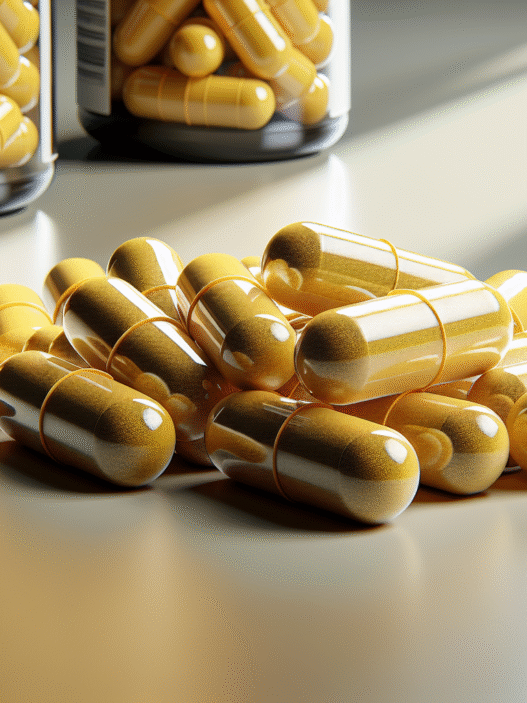Understanding Berberine
Introducing Berberine
Berberine is an isoquinoline alkaloid compound extracted from the plant Coptis chinensis. Its pharmacological properties have drawn attention due to its potential health benefits, particularly for individuals interested in functional medicine and holistic wellness. Berberine is particularly noted for its effectiveness in lowering blood glucose levels and improving insulin sensitivity, making it a popular choice among bodybuilders and health enthusiasts looking to optimize their performance and overall well-being. Studies indicate that this compound can also help with hyperlipidemia and may prevent mild cognitive impairment.
Mechanisms of Action
The effectiveness of berberine can be attributed to its action on several biological pathways. One of the primary mechanisms is the activation of AMP-activated protein kinase (AMPK) which regulates metabolism. Activation of AMPK helps to reduce fat production, improve insulin sensitivity, and promote glucose transport across cell membranes.
Berberine also contributes to better insulin sensitivity by adjusting the adipokine profile in human preadipocytes and in patients with metabolic syndrome. Research has shown that after three months of berberine treatment, patients experienced a significant decrease in body mass index (BMI) and leptin levels, along with improvements in other metabolic markers.
Moreover, berberine has been found to lower cholesterol and triglyceride levels while raising HDL (good) cholesterol, potentially reducing the risk of heart disease — a significant concern for many, especially those engaging in rigorous bodybuilding regimens.
The widespread interest in berberine stems not only from its health benefits but also from the evolving research on its impact on metabolic health, making it an intriguing supplement for those striving to enhance their physical performance and overall vitality.
Benefits of Berberine
Berberine has garnered attention in the health community due to its various benefits, particularly for individuals seeking to enhance their overall wellness and manage specific health issues. Here are some key benefits associated with berberine.
Weight Management Effects
Research indicates that berberine may assist with weight loss. In a 2022 review, significant reductions in weight and body mass index were noted among individuals taking more than 1 gram of berberine daily for over eight weeks. However, many studies included in this review exhibited a high risk of bias, highlighting the need for more rigorous research.
In a specific study involving individuals with obesity, participants who took 500 milligrams of berberine three times daily for 12 weeks lost around 5 pounds and experienced a 3.6% reduction in body fat. The table below summarizes the findings regarding weight loss with berberine.
| Study Duration | Dosage | Weight Loss | Body Fat Reduction |
|---|---|---|---|
| 12 weeks | 1,500 mg/day | Significant | Not Specified |
| 12 weeks | 1,500 mg/day | ~5 pounds | 3.6% |
Blood Sugar Regulation
Berberine has been shown to effectively lower blood sugar levels, particularly in people diagnosed with type 2 diabetes. One study documented a notable 20% decrease in fasting blood sugar levels when participants consumed 1 gram of berberine per day. By improving insulin sensitivity and reducing glucose production in the liver, berberine helps maintain healthier blood sugar levels, which can be beneficial for weight management and metabolic health.
Cholesterol and Heart Health
Berberine has been linked to improvements in cardiovascular health by lowering cholesterol levels. Research indicates that berberine can lower apolipoprotein B levels by 13-15%. It also inhibits an enzyme known as PCSK9, which facilitates the removal of LDL cholesterol from the bloodstream—an important factor in preventing heart disease. The table below highlights the effects of berberine on cholesterol and heart health.
| Health Metric | Effect |
|---|---|
| Apolipoprotein B | Decrease of 13-15% |
| LDL Cholesterol | Increased removal from blood |
The benefits of berberine extend well beyond weight management, also encompassing vital aspects of metabolic health and cardiovascular wellness. For those seeking to improve their overall health, understanding the myriad benefits of berberine can be a crucial step in enhancing their wellness journey.
Potential Health Applications
Berberine has garnered attention not only for its benefits in metabolic health but also for its potential applications in various other health areas. This section delves into some of the noteworthy health applications of berberine, including its anti-inflammatory effects, antioxidant properties, and mental health impact.
Anti-inflammatory Effects
Berberine exhibits potent anti-inflammatory properties, making it potentially beneficial for those dealing with chronic inflammatory conditions. By inhibiting inflammation pathways, it can help reduce inflammation markers in the body, leading to improved overall health. Preliminary research has indicated that berberine may provide therapeutic benefits against conditions such as heart failure and fatty liver disease (Healthline).
| Inflammation Marker | Effect of Berberine |
|---|---|
| C-reactive protein (CRP) | Reduction observed |
| Tumor necrosis factor-alpha (TNF-α) | Inhibition of activity |
| Interleukin-6 (IL-6) | Lower levels reported |
Antioxidant Properties
The antioxidant properties of berberine enable it to neutralize free radicals in the body, thereby protecting cells from oxidative stress. This protection is vital, as oxidative stress is linked to various chronic diseases and aging. The antioxidant capability of berberine makes it a promising supplement for individuals seeking to enhance their overall health and protect against oxidative damage (Healthline).
| Antioxidant Activity | Benefit |
|---|---|
| Neutralization of free radicals | Reduction in oxidative damage |
| Cellular protection | Potential prevention of chronic diseases |
Mental Health Impact
Emerging research suggests that berberine may play a role in mental health support. Preliminary studies indicate its potential benefits against conditions such as depression and anxiety. The mechanisms behind this effect may include the regulation of neurotransmitters and reduction of inflammation, which are both crucial for maintaining mental well-being. For those following functional medicine and holistic wellness, integrating berberine into their regimen may represent a step towards improved mental health.
| Mental Health Condition | Potential Effect of Berberine |
|---|---|
| Depression | Possible symptom improvement |
| Anxiety | Potential regulation of mood |
As research continues to unfold, berberine could prove to be a versatile supplement with multiple health applications beyond just metabolic benefits. For a comprehensive overview of the effects and potential downsides of berberine, consider exploring our discussions on is there a downside to taking berberine? and what does mayo clinic say about berberine?.
Dosage and Side Effects
Understanding the correct dosage and potential side effects of berberine is essential for anyone considering it as a supplement. This section will cover recommended dosages, possible digestive side effects, and interactions with medications.
Recommended Dosage
The common dosage recommendation for berberine is 500 mg three times per day. This dosage allows for a balanced intake throughout the day to maximize its benefits. For more detailed information on timing, one may refer to articles addressing how soon before eating should you take berberine?.
| Dosage | Frequency |
|---|---|
| 500 mg | 3 times daily |
Digestive Side Effects
While berberine offers numerous health benefits, there are some side effects to be aware of, particularly those related to digestion. Common reports include:
- Diarrhea
- Constipation
- Bloating
These side effects may vary based on individual tolerance levels. For more insights into any potential downsides, readers can check is there a downside to taking berberine?.
Interaction with Medications
Berberine has the potential to interact with various medications, leading to significant effects. Notably, it may lower blood sugar levels, which can lead to dangerously low blood sugar when taken alongside diabetes medications. Close monitoring of blood sugar levels is recommended (WebMD).
Additionally, berberine can slow blood clotting, so when taken with other anticoagulant medications, it might increase the risks of bruising and bleeding. It can also lower blood pressure, necessitating careful monitoring for those on blood pressure medications (WebMD).
Lastly, caution should be exercised when combining berberine with sedative medications, as both substances could lead to increased sleepiness and slowed breathing, which may result in breathing problems (WebMD).
In summary, those interested in berberine should understand the recommended dosage, remain vigilant about potential digestive disturbances, and consult healthcare professionals for any contraindications with current medications. For further exploration regarding the impacts of berberine, including its larger health implications, readers may refer to additional articles linked throughout this section.
Research and Studies
Research on berberine highlights its benefits, particularly in relation to blood sugar control, weight management, and heart health. The findings of various studies provide evidence for its effectiveness as a supplement, especially among bodybuilders and individuals seeking improved metabolic health.
Clinical Findings
Several clinical studies have investigated the effects of berberine on health metrics. Key findings include:
| Study Focus | Result |
|---|---|
| Blood Sugar Control | A study showed a 20% decrease in fasting blood sugar with 1 gram of berberine per day for individuals with type 2 diabetes. |
| Weight Loss | Taking 500 milligrams of berberine three times daily for 12 weeks led to a weight loss of approximately 5 pounds and a 3.6% reduction in body fat. |
| Cholesterol Levels | Berberine reduced apolipoprotein B levels by 13-15% and inhibited PCSK9, assisting in lowering LDL cholesterol, thus benefiting heart health (Healthline). |
These clinical findings support the use of berberine as a significant adjunct in managing conditions like diabetes, obesity, and heart disease.
Comparative Studies
Comparative studies further illustrate berberine’s effectiveness in metabolic health. Notably, it is recognized for its ability to significantly lower blood glucose levels and enhance insulin sensitivity, with some findings suggesting it is comparable in potency to traditional diabetes medications.
| Comparison | Effectiveness |
|---|---|
| Blood Glucose Reduction | Berberine is known to be as effective as pharmaceutical drugs for managing diabetes symptoms. |
| Metformin Comparison | Studies show berberine may rival Metformin in lowering blood glucose and improving insulin sensitivity in individuals with type 2 diabetes. |
These studies not only affirm the benefits of berberine in metabolic health but also highlight its potential as a natural alternative for bodybuilders and health-conscious individuals alike. For those curious about the implications of berberine supplementation, including potential downsides, refer to our article on is there a downside to taking berberine?.
Berberine in Metabolic Health
Impact on Insulin Sensitivity
Berberine has been shown to significantly improve insulin sensitivity, making it a valuable tool for those managing metabolic health. Research indicates that berberine achieves this by inhibiting fat storage and modifying the adipokine profile in individuals with metabolic syndrome. A study reported that after 3 months of berberine treatment, patients experienced a decrease in Body Mass Index (BMI) from 31.5 ± 3.6 to 27.4 ± 2.4 kg/m² and a notable reduction in leptin levels.
This improvement in insulin sensitivity allows for better glucose utilization and regulation, which is crucial for metabolic health. Overall, data suggests that berberine activates AMP-activated protein kinase (AMPK), resulting in enhanced glucose transport and reduced fat production.
Effects on Metabolism
Berberine positively influences metabolism by promoting various biochemical pathways essential for energy regulation. In studies, berberine administration resulted in significant reductions in triglycerides (TG), total cholesterol (TC), low-density lipoprotein (LDL), high-density lipoprotein (HDL), fasting plasma glucose (FPG), and HOMA-IR levels—an index of insulin resistance. The therapeutic effects of berberine become particularly pronounced with treatment durations exceeding 3 months (Frontiers in Pharmacology).
Moreover, berberine stimulates the proliferation of human preadipocytes while inhibiting the differentiation of mature adipocytes. This dual functionality presents potential applications for reducing visceral fat and managing central obesity, which often accompany metabolic disorders. Overall, berberine’s comprehensive influence on metabolic health highlights its significance in functional medicine and holistic wellness.
For more information, read about the pros and cons of berberine and explore what the Mayo Clinic says about berberine.





















